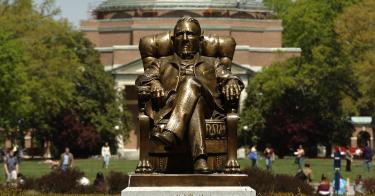Picture this: You’re a high-school senior who just scored early admission into your dream university. You’re elated … until you realize you’ve also locked yourself into whatever financial-aid package the school decides to offer, with no ability to shop around or negotiate.
Congratulations, you’ve just become Exhibit A in a new class-action lawsuit (well, not literally) that accuses America’s most elite universities of running what amounts to an admissions cartel.
Four students filed a federal lawsuit in a Massachusetts federal district court in August, targeting Duke University and other top-tier institutions, as well as the Consortium on Financing Higher Education. Their claim? That the early-decision system, intended to reward enthusiastic applicants, actually serves as cover for an anticompetitive scheme that drives up tuition and guts financial aid.
The plaintiffs want the defendants held “jointly and severally liable,” legalese meaning that any one university can be on the hook for the full damages regardless of its individual role (though it can later seek money from its co-defendants).
The plaintiffs seek to represent a class, pursuing legal action on behalf of other students who experienced similar circumstances. Class-action lawsuits enable a group of plaintiffs to sue on behalf of a larger collection of individuals facing comparable harm (to address situations where individual damages may be minor but collectively significant).
>>> Rightly Rated: New Survey Affirms Colleges Promoting Virtue and Tolerance
Early decision typically involves high-school seniors applying to their preferred institution in the fall, receiving a response shortly before Christmas, and, if accepted, committing to attend and withdrawing other applications. But, according to this lawsuit, it’s really an elaborate shell game that violates the Sherman Antitrust Act, the century-old law designed to prevent companies from conspiring to rig markets and squeeze consumers.
The core problem, according to the complaint, is that early decision operates as what the plaintiffs call an “honor-bound agreement that imposes ethical obligations” rather than an enforceable contract. Without a binding contract, universities gain substantial leverage. As the lawsuit explains, “Defendant colleges and universities essentially force Early Decision admittees to be bound to the school that offered early admission by preventing students from receiving and comparing offers from other schools.” Yet students face no legal recourse if universities change tuition, programs, or financial-aid packages after acceptance.
The lawsuit characterizes early decision as a horizontal restraint: an agreement among competitors at the same level of the market (in this case, elite universities) to limit competition among themselves. The complaint argues that this situation represents “a classic per se violation of the antitrust laws,” meaning conduct so inherently anticompetitive that it’s illegal without requiring proof of actual market harm.
According to the filing, “Ultimately, Early Decision is enforced by mutual agreement between would-be competitors not to compete for students offered admission through Early Decision at other schools.” Thus, Duke, for example, will not attempt to recruit an early-decision admittee at Vanderbilt. This is a problem, the filing alleges, because “a school has no legal, moral, academic, or self-interest-based reason not to compete for students offered admission at other schools through Early Decision, any more than it does to refrain from competing for students offered admission by other schools through the regular admissions process.”
The plaintiffs allege that the defendant universities have “openly participated and are participating in practices that entrench patterns of inequality of access while inflating the price of attendance,” with early decision serving as the central anticompetitive mechanism.
In a competitive marketplace, universities would bid for talented students through financial-aid packages and other incentives. The lawsuit explains that, because “school administrators understand that each aid-seeking student is likely to receive financial aid offers from competing schools, schools are incentivized to offer more generous packages in their initial offers and to negotiate improved packages when an accepted student requests additional aid before committing to a school.”
Early decision eliminates this dynamic entirely. Once a student commits through early decision, competing schools honor that commitment and cease recruiting efforts. The result, according to the complaint, is that “the schools lose their incentive to compete on price for students admitted through Early Decision, driving up overall ‘top line’ tuition levels and reducing both need-based and merit-based aid for Early Decision admittees.”
Worse still, the alleged conspiracy doesn’t just harm early-decision participants. As the plaintiffs allege, “The result is that both Early Decision and non-Early Decision students pay higher prices than they would have paid absent the conspiracy at the center of the Early Decision scheme.”
The lawsuit contends that early decision systematically disadvantages certain students while benefiting others: “Early Decision is widely acknowledged to disadvantage price-sensitive students and those who lack the awareness and/or resources to participate in the Early Decision process, even as it drives up prices for the wealthier, less price-sensitive students who have the resources to play the game.”
Students, especially those from lower-income families who want to compare financial-aid packages, usually do not receive the admissions advantage of early decision. Even if they know about it, they can’t afford to play by its rules. Meanwhile, wealthy students who can commit without seeing the financial details gain acceptance advantages at institutions with limited spaces.
>>> Football Rankings Are Important, but This One Matters More
This scheme has purportedly “benefited the participating colleges and universities at the expense of students and applicants” and was designed to “increase overall tuition levels and to decrease financial aid, thereby increasing the net price of attending these institutions.”
Adding to the antitrust concerns, the plaintiffs argue that there are no alternative markets for institutions of comparable prestige and selectivity, leaving students with no competitive options outside this allegedly coordinated system.
This case presents an unusual dilemma for conservatives. On the one hand, it offers a satisfying spectacle: Elite, left-leaning universities—institutions that frequently champion egalitarian principles—stand accused of operating a cartel that widens wealth gaps and entrenches inequality. The hypocrisy is rich!
On the other hand, many conservatives harbor deep skepticism toward both antitrust enforcement and class-action litigation. Antitrust law expands government intervention in private business arrangements and can discourage legitimate cooperation. Class-action lawsuits, meanwhile, often enrich plaintiffs’ attorneys while delivering minimal benefits to class members—and they can impose crushing costs on defendants regardless of actual wrongdoing.
Thus, for conservatives who prioritize free markets and oppose frivolous litigation, supporting this case requires embracing legal mechanisms they typically oppose.
Whether early decision represents a genuine antitrust conspiracy or a legitimate admissions practice will ultimately be for the courts to decide. What’s certain is that this lawsuit strikes at the heart of how America’s most elite institutions manage their most precious resource: admission itself. The case asks whether prestigious universities should be allowed to structure their admissions processes cooperatively or whether antitrust law demands they compete aggressively for every student, every time.
In a system where a single acceptance letter can reshape a life’s trajectory, the stakes extend far beyond any individual plaintiff’s tuition bill.
This piece originally appeared in The James G. Martin Center for Academic Renewal




